 |
The Future of Food
Dr. Shiva request NRIs to Join the Movement
Efforts to rescue India’s farmers and the purity and diversity of India’s ancient seeds
Los Angeles, Nov 30, 2012
NRIpress-Club/ Gary Singh
More than one million children die every year of hunger and malnutrition in India. More than 300,000 farmers suicides since the 90’s due to indebtedness because of failure of industrial, Western agricultural methods such as genetically engineered seeds & chemical farming.
Dr. Vandana Shiva, currently based in Delhi, Dehra Dun born physicist, philosopher, environmental activist, editor and authored more than 20 books, eco feminist, Ph.D. in philosophy from the University of Western Ontario, Canada in 1978 with the doctoral dissertation "Hidden variables and locality in quantum theory, run her Indian nonprofit organization Navdanya directly addresses and provides solution to threats facing India and the entire world from unsustainable practices, particularly industrial agriculture. She is fighting for changes in the practice and paradigms of agriculture and food.
- Dr. Shiva has organized to stand against seed monopolies-- Seed Satyagraha is the name for the nonviolent and non-cooperative movement
In 2003, Time Magazine identified Dr. Shiva as an environmental “hero”. Asia Week has called her one of the five most powerful communicators of Asia.
- She is member of the scientific committee of the Fundacion IDEAS, Spain's Socialist Party's think tank.
- She is also a member of the International Organization for a Participatory Society.
- She was awarded the Right Livelihood Award in 1993.
Travelled to US to enlighten NRIs and Americans:
- To bring awareness to the environmental crisis facing India, and its economic and social impact on rural and farming communities
- To promote and support solutions to rural hunger and poverty in India via sustainable organic farming and biodiversity conservation and to protect and preserve indigenous knowledge
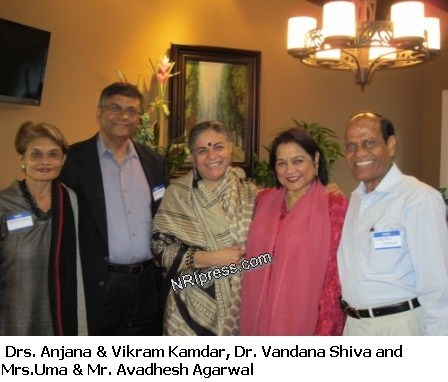
Oct. 28, 2012, she spoke to a gathering of NRI entrepreneurs and business community at Philanthropist, Mr. Avadhesh and Mrs. Uma Agarwal’s residence in Palos Verdes (Los Angeles), California. Mr. Avadhesh Agarwal is a president of UMA Enterprises which is one of the largest importers and wholesalers in the Home Decor Industry.
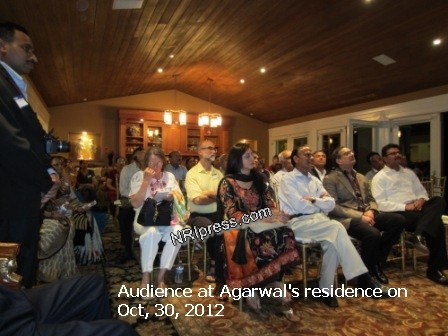
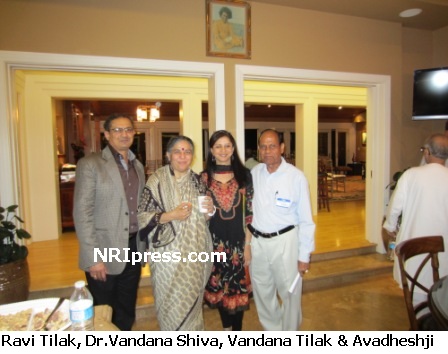
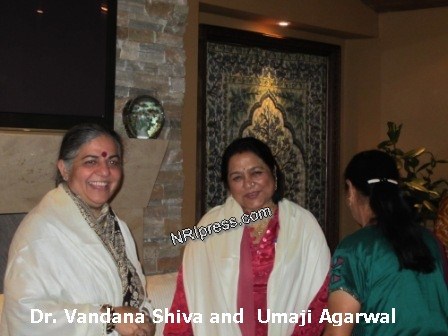
Oct. 29, she spoke to the people hosted by Nancy Brown, a UC Santa Barbara affiliate, Santa Barbara and later had interview with Evan Klieman, host of KCRW radio show Good Food. She also met a group of environmental activists sponsored by Balcony Films
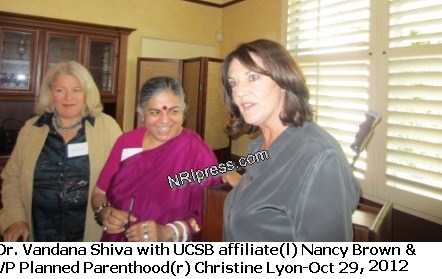
Oct. 30, she gave a morning radio interview for KPFK’s Sonali Kolhatkar. In the evening, she spoke at Loyola Marymount University, around 700 people. She also met community leaders who would continue her work under the banner of Friends of Navdanya--Seed Freedom LA/Navdanya
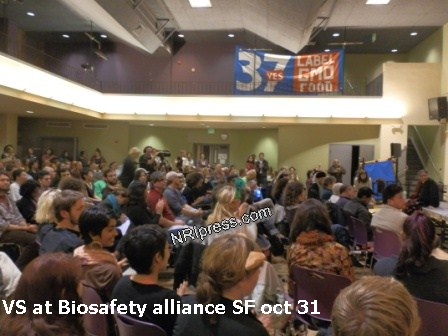
Oct. 31, she spoke at San Francisco sponsored by the Biosafety Alliance on promoting seed sovereignty and on Prop 37- to label foods containing genetically modified crops
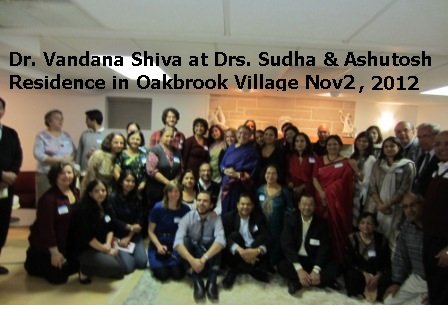
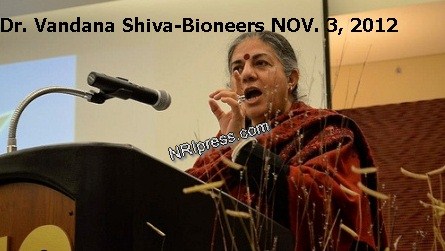
Nov 01, She traveled to Chicago and spoke at North Park University on the subject of “What is Nature?” and gave interview to Chicago station WBEZ next day. Same night, she was invited by NRI community leaders at Drs. Sudha and Ashutosh Gupta’s home with special guest President of Oakbrook Village and Dr. Gopal Lalmalani.
Nov. 03, she spoke at Great Lakes Bioneers Chicago conference and return to India at the night flight. Dr. Vandana Shiva spoke around ten places including on radio shows interview in short time of travel to USA.
Dr. Vandana Shiva always talk about changes in the practice and paradigms of agriculture and food. Intellectual property rights, biodiversity, biotechnology, bioethics, genetic engineering are among the fields where Shiva has contributed intellectually and through activist campaigns.
Dr. Shiva has argued for the wisdom of many traditional practices, as is evident from her interview in the book Vedic Ecology that draws upon India's Vedic heritage. She is one of the leaders and board members of the International Forum on Globalization, and a figure of the global solidarity movement known as the alter-globalization movement
- In 1982, she founded the Research Foundation for Science, Technology and Ecology, which led to the creation of Navdanya in 1991, a national movement to protect the diversity and integrity of living resources, especially native seed, the promotion of organic farming and fair trade.
- For last two decades Navdanya has worked with local communities and organizations serving many men and women farmers.
- Navdanya’s efforts have resulted in conservation of more than 2000 rice varieties from all over the country and have established 34 seed banks in 13 states across the country.
- More than 70,000 farmers are primary members of Navdanya. In 2004 Dr Shiva started Bija Vidyapeeth, an international college for sustainable living in Doon Valley, in collaboration with Schumacher College, U.K.
- Shiva appeared in a documentary film about the Dalai Lama, entitled Dalai Lama Renaissance
- In 2010, Vandana was interviewed in the feature documentary about honeybees and colony collapse disorder entitled, "Queen of the Sun".
- In 2012, Dr. Vandana Shiva was interviewed in the feature documentary Roshni: Ray of Light
- Her first book, Staying Alive (1988) helped redefine perceptions of third world women.
- In 1990, she wrote a report for the FAO on Women and Agriculture entitled, “Most Farmers in India are Women”. She founded the gender unit at the International Centre for Mountain Development (ICIMOD) in Kathmandu and was a founding Board Member of the Women's Environment & Development Organization (WEDO)
She has been interviewed for a number of documentary films including the One Water, Deconstructing Supper: Is Your Food Safe?, The Corporation, Thrive, Dirt! The Movie, Roshni: Ray of Light, and This is What Democracy Looks Like (a documentary about the Seattle WTO protests of 1999.
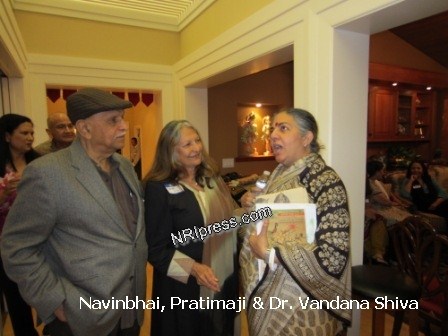
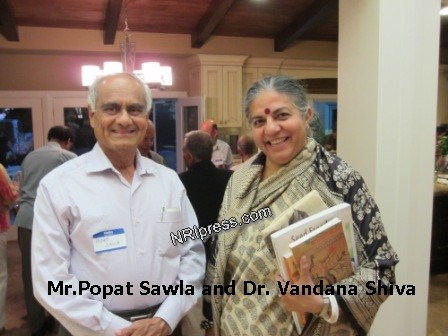

|